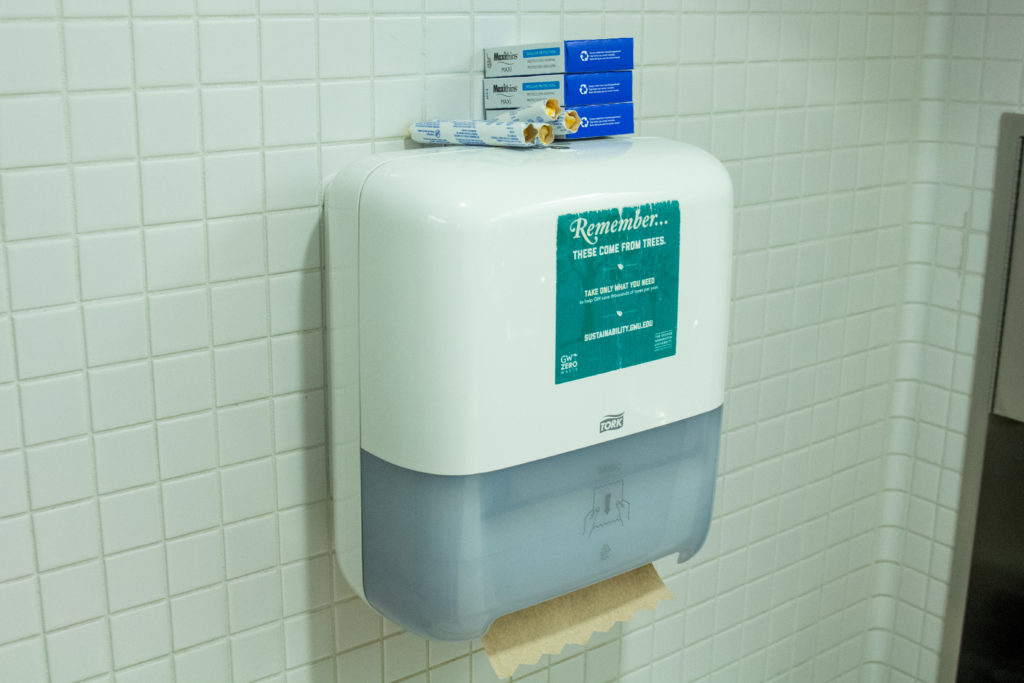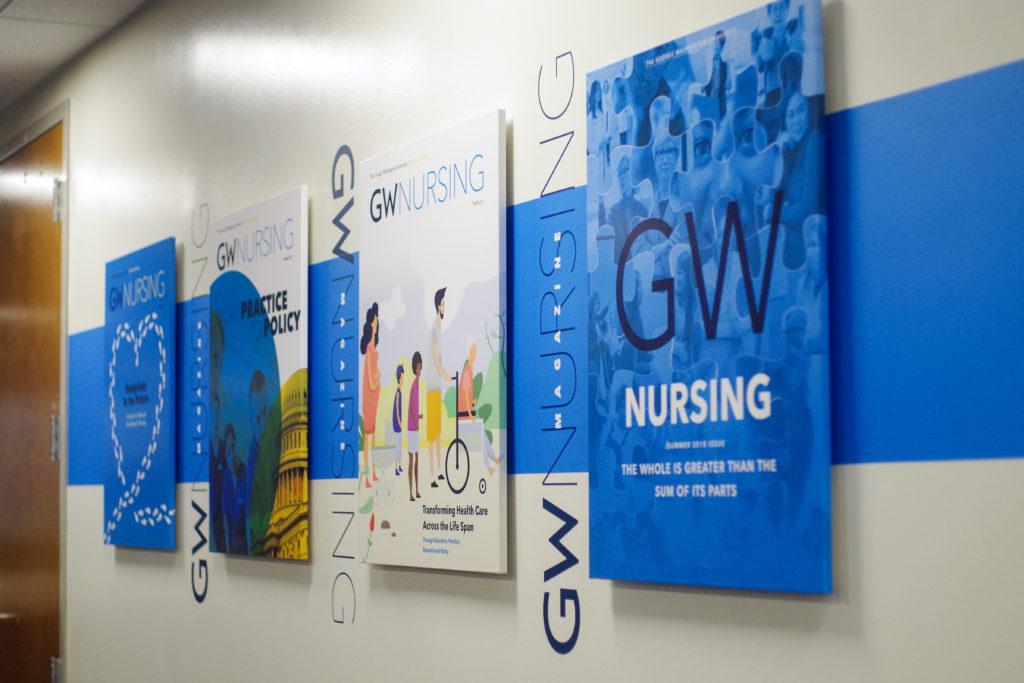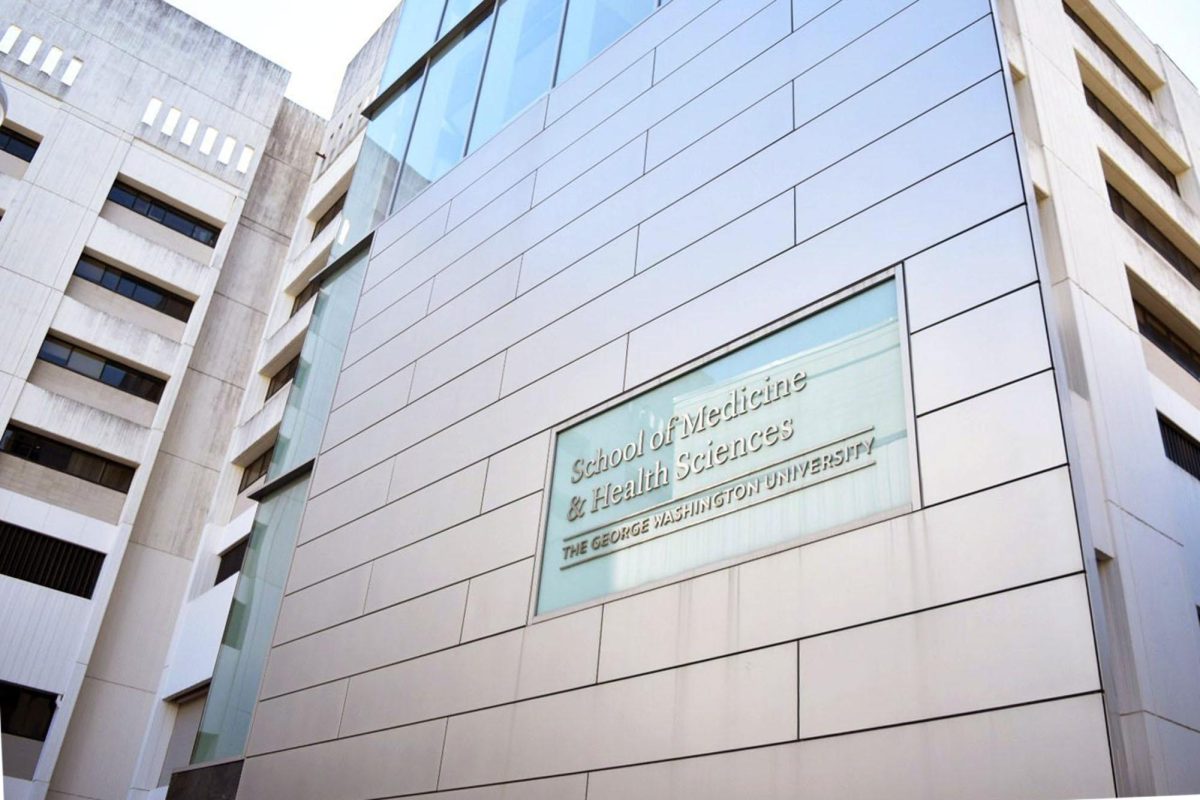Officials are installing free period product dispensers in campus bathrooms to ensure their compliance with a nearly year-old D.C. law mandating schools offer free pads and tampons.
Congress codified the Expanding Student Access to Period Products Emergency Act into law last March, ordering universities and private, public and charter schools in the District to provide menstrual product dispensers in all female and gender-neutral bathrooms. But many of GW’s buildings are currently in violation of the law – just nine of 29 buildings with academic and dining space that The Hatchet inspected on the Foggy Bottom and Mount Vernon campuses carried the free dispensers as of Thursday and Friday.
The Hatchet found free period product dispensers in seven of 25 buildings on Foggy Bottom – Gelman Library, 1957 E St., the Milken School of Public Health, the Graduate School of Education and Human Development, District House and Duques and Shenkman halls. Two of the four academic buildings on the Vern had dispensers in bathrooms.
There were at least three empty dispensers across both campuses Thursday and Friday, including one nonfunctional dispenser in 1957 E St. In at least five campus bathrooms, officials hadn’t installed a dispenser, but tampons or pads sat on paper towel machines or counters.
Based on The Hatchet’s review of more than 150 bathrooms, period product dispensers were installed in women’s, men’s and gender-neutral bathrooms, but only in about one or two bathrooms of every building, leaving most bathrooms across campus without dispensers.
The Hatchet was unable to access Ross Hall and the Jacob Burns Law and Himmelfarb Health Sciences libraries because tap access is restricted to graduate students in those buildings.
University spokesperson Julia Metjian said earlier this month that officials ordered 400 dispensers that they will install in campus bathrooms after they arrive in the next “few weeks.” Metjian declined to comment on how officials decided on the number of dispensers to order and which bathrooms would receive them.
“Officials will install a dispenser providing products in every public all-gender and women’s restroom on campus in compliance with D.C. law,” Metjian said in an email.
She said Gelman and Eckles libraries, District House, 1957 E St., The Milken Institute School of Public Health, Duques, Ames, Innovation, and the Science and Engineering halls currently have dispensers.
Based on The Hatchet’s review of campus bathrooms, SEH has no dispensers in any of its 20 bathrooms.
Metjian said officials will post signage by the dispensers with information about the safe use and disposal of the products – as required by the law – when the Office of the State Superintendent of Education, D.C.’s education agency, provides the materials. She said after the dispensers’ installation, GW Facilities personnel will service the dispensers to sustain their compliance with the law.
At a Student Bar Association Senate meeting in January, Leila Diallo, the chair of the senate’s student life committee, said she conferred with officials about the GW’s lack of compliance with the legislation at the end of the last calendar year after discovering the law. She started a period product dispenser pilot program in the law school earlier this year, providing and stocking baskets of products in the school’s bathrooms which she said were depleted within just 24 hours of filling them.
Diallo said although officials agreed to fund permanent dispensers, they previously resisted refilling them because of “logistical” issues with a contractor and suggested a student organization take up the responsibility instead.
“The University’s commitment to a diverse and inclusive community requires it to redress inequities and to promote equitable outcomes through actions that enable everyone to flourish,” Diallo said in an email.
Students and officials have been pushing for period product dispenser installation in campus bathrooms for at least six years after three student organizations partnered to offer products in District House, Gelman, 1957 E St. and Milken in 2017. Four years later, the Student Association announced officials had installed additional dispensers in Duques, Ames and Innovation halls and Eckles Library.
Ward 2 D.C. Council member Brooke Pinto, who represents the area encompassing Foggy Bottom and penned the period product legislation that was enacted last year, said she received “some pushback” about whether the legislation was the “best use” of tax dollars leading up to its passage.
“It is absolutely unacceptable for any student to lose out on time in the classroom because of their period,” Pinto said in an email.
Two-thirds of menstruating students have missed out on school time because they lacked period products, according to a 2021 PERIOD study. PERIOD, a global menstrual education and advocacy nonprofit, reported that one in four menstruating students could not access period products that year – a jump from one in five students in 2019.
Maddy Niziolek, co-president of GW RAGE, a reproductive autonomy and gender equity advocacy student organization, said GW’s recent efforts to comply with the law are “long overdue” because other universities have provided free products for more than a decade, such as the University of Minnesota’s 2007 mandate.
Lawmakers in states like California, Delaware, Illinois, Maryland, Nevada, Oregon, Rhode Island and Washington have enacted similar legislation mandating “local education agencies” provide free menstrual products in female restrooms since 2021.
Niziolek said free period product dispensers offer a solution to the “many” GW students who cannot afford to purchase “costly” menstrual products, a burden she said falls disproportionately on people of color and transgender and nonbinary students.
The average cost of period products per menstrual cycle is about $20 a month, according to a January 2021 study by the National Organization for Women. The price of period products increased by about nine percent with inflation during the first five months of 2022. Additionally, 22 states place a sales tax on period products as of September 2022.
Niziolek said the dispensers also alleviate practical concerns in cases students forget to carry their own menstrual products, didn’t know they were on their period or didn’t bring coins to the dispensers that charge for products, like those at Gelman Library and Shenkman and Lisner halls.
“GW already provides other bathroom products like soap, toilet paper and paper towels,” she said. “Why are menstrual products any different?”
Sarah Howard – the director of marketing at Aunt Flow, a menstrual product dispenser company – said during her work partnering with companies and institutions to implement Aunt Flow’s dispensers students were usually the first to sound alarms about menstrual equity and spearhead efforts to increase period product access on their campus.
“Students that are passionate about getting dispensers on campus are the ones that are typically doing that grassroots kind of surveying and using Google Forms to collect student data with QR codes and signage in the bathrooms,” Howard said.
Ameer Abdulrahaman – the national campaign manager for PERIOD – said period product legislation goes unenforced in some cities and states because the bills lack a governmental funding source. He said school administrations treat funding issues as an “excuse” to not finance dispenser installations at times, despite backing other expenditures.
A D.C. Council committee report on the bill states the District’s Fiscal Year 2022 budget provided $1.64 million in funds for the legislation’s implementation. Installing and stocking period product dispensers in school bathrooms costs between $5 and $7 dollars per student per year, according to Free the Tampons, a restroom equality advocacy organization.
“When issues are prioritized, they’re enforced,” Abdulrahaman said. “It’s that simple.”
Cade McAllister, Lydie Lake, Max Porter, Moksha Akil, Vaughan Goff, Rory Quealy, Sejal Govindarao, Cristina Stassis, Shea Carlberg, Fiona Bork, Anna Zell and Pravina Khadka contributed reporting.











